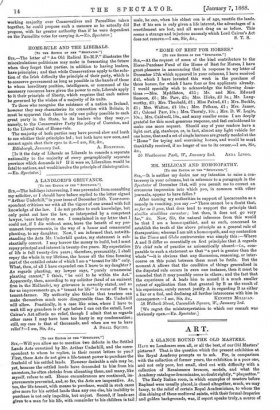A LANDLORD ' S GRIEVANCE.
[To THE EDITOR OF THE " SPECTATOR."]
Sin,—The holidays intervening, I was prevented from consulting my solicitor, or I should have before replied to the letter signed "Arthur Underhill," in your issue of December 24th. Your corre- spondent criticises me with all the vigour of one armed with full knowledge of the law. I do not profess to such knowledge, but only point out how the law, as interpreted by a competent lawyer, bears heavily on me. I complained in my letter that I could not, if I die without sons, leave the benefit of my per- manent improvements, in the way of a house and ornamental planting, to my daughter. Now, I am informed that, notwith- standing the Acts Mr. Underhill quotes, my statement is sub- stantially correct. I may borrow the money to build, but I must repay principal and interest in twenty-five years. My expectation of life is full twenty-five years ; therefore, presumably, I shall repay the whole in my lifetime, the house all the time forming part of the entailed estate of which Tam a "tenant for life" only. What, then, of all I have expended can I leave to my daughter? As regards planting, my lawyer says, "purely ornamental planting cannot," I think, "be said to be within the Act." Apparently, then, according to my solicitor (head of an eminent firm in the Midlands), my grievance is correctly stated, and so far as improvements go, a "tenant for life" is worse off than a tenant-farmer. My authority also thinks that trustees can make themselves much more disagreeable than Mr. Underhill will allow. Practically, in a case like mine, where I have to wait till my grandson is of age before I can cut the entail, Lord Cairns's Act affords no relief, though I admit that as regards other cases I may have been too hasty in my condemnation ; still, my case is that of thousands, and when are we to have






















































 Previous page
Previous page